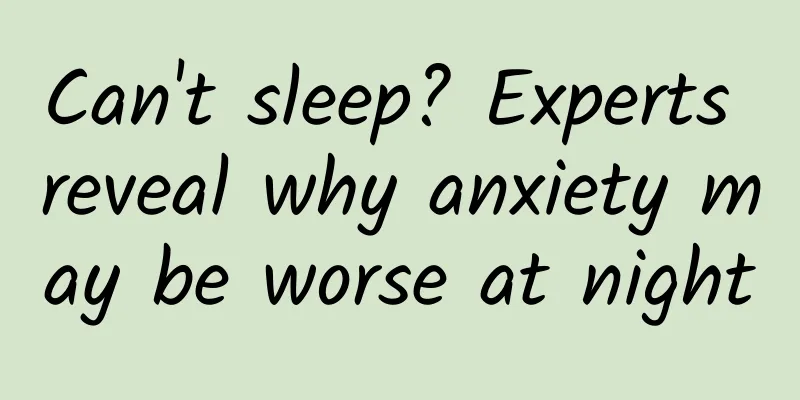Can't sleep? Experts reveal why anxiety may be worse at night

|
Occasional anxiety is a normal part of life, from being nervous before a big test to feeling awkward in uncomfortable social situations. But when anxiety becomes persistent and recurring, it's called generalized anxiety disorder and affects a person's daily life. Anxiety can also affect sleep. According to a 2022 study in the journal Sleep Medicine Reviews, about 50% of people with anxiety also have trouble sleeping, so why is anxiety worse at night? 1. Why does anxiety sometimes get worse at night? One reason anxiety may get worse at night is that people simply can’t release nervous energy. During the day, people are busy with work, social, and family obligations, said Carolyn Miller, a New York City clinical psychologist who specializes in anxiety and sleep disorders. Many people with anxiety disorders are good at channeling their excess energy into productive projects. But at night, people slow down and have fewer distractions, which can lead to increased anxiety. A key feature of anxiety [disorders] is persistent and excessive worrying, which becomes apparent when you are lying in bed with nothing to distract you. 2. The role of fear and darkness People in general — not just those with anxiety disorders — may be more likely to feel anxious and fearful at night, a study suggests. Research published in the International Journal of Psychophysiology in 2015 found that people without anxiety disorders showed a stronger fear response at night when exposed to the same fear-based stimulus during the day and at night. This was measured physically (heart rate and skin conductance activity) and psychologically (subjective reports of fear). The authors said this suggests that people may process information differently at night — and be more likely to feel anxious, although it's unclear why. But for people who suffer from chronic stress or anxiety, other factors may partly explain why the worry monster often rears its head at night. Generally speaking, when we are stressed or perceive a threat, the body produces adrenaline and cortisol, which allows us to focus on the perceived threat, and once the threat has passed, cortisol and adrenaline levels should return to normal. However, when people experience chronic stress or anxiety, cortisol may remain elevated. Cortisol, melatonin, and other sleep-related hormones are normally regulated on a 24-hour cycle called the circadian rhythm. Typically, cortisol levels peak in the morning and then slowly decline throughout the day, reaching their lowest point in the middle of the night, according to a 2015 review of studies published in the journal Sleep Science. But elevated adrenaline levels during the day and night in people with anxiety disorders may keep cortisol levels high and disrupt the release of other sleep hormones, which in turn could affect sleep, the researchers speculate. There is evidence that worrying about sleep can make the problem worse. A few nights of high anxiety and disrupted sleep can lead to negative expectations about sleep, which further impairs sleep—this can become a vicious cycle, in other words, worrying about insomnia causes you to lose more sleep. But while some of the factors that exacerbate nighttime anxiety are outside of your direct control, there are some triggers you can avoid. Caffeine and other stimulants, electronic devices, stress, and sleep deprivation are all triggers, so the choices people make during the day, such as drinking caffeine close to bed, can have a knock-on effect that exacerbates anxiety at night. Source: Chongqing Tianji Network Co., Ltd. Source: Live Science "Can't sleep? An expert reveals why anxiety may be worse at night" Statement: Except for original content and special notes, some pictures are from the Internet. They are not for commercial purposes and are only used as popular science materials. The copyright belongs to the original authors. If there is any infringement, please contact us to delete them. |
<<: Eating rice vs. eating noodles, which one makes you fatter? Here’s the truth!
Recommend
How long does it usually take to cure amenorrhea with Chinese medicine?
For every woman, the process from estrus to the f...
Is it okay to urinate right after sex?
Everyone has different sexual habits. Some people...
The causes and clinical manifestations of retroverted uterus and uterine prolapse
How much do you know about the causes and clinica...
Is it necessary to protect the fetus if you are pregnant with polycystic ovary syndrome?
In order to successfully get pregnant, the physic...
I just had myopia surgery and my vision is blurry up close. Is this normal?
After myopia surgery, some patients reported that...
Forward! 6 actions to test whether you have Parkinson's disease
Parkinson's disease, the "silent killer&...
What causes small pimples on nipples?
Women should of course pay special attention to t...
How to treat the symptoms of premature menopause
Menopause is an important period for human beings...
Can thin people also get fatty liver? Is eating too much fruit bad for the liver? Remember these "little liver" tips
A 25-year-old girl weighing 90 pounds suffers fro...
How many days of rest is best for medical abortion
There are two main ways for modern people to term...
Can I still have abortion after multiple abortions?
In today's society, we often hear news report...
How to treat female vitiligo
With the development of modern science and techno...
I have had oil in my urine for seven years.
Is it important to have oil droplets in women'...
How to choose between conservative and surgical treatment for obstructive sleep apnea in children?
Author: Chang Li, Chief Physician, Children's...
What causes right back pain in women
Women's bodies are relatively more susceptibl...









